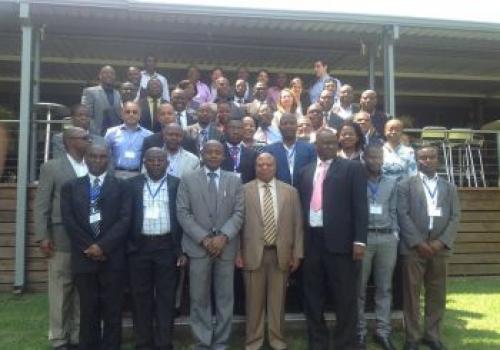SADC says Green Economy is a key catalyst for growth and poverty eradication in developing countries including the SADC region where close to 90 per cent of the GDP of the poor is linked to nature or natural capital such as forests and freshwaters.This was said by Zimbabwe’s Director of Environment in the Ministry of Environment, Water and Climate Change, Mr Irvine Kunene, who was representing the SADC Chair ,Zimbabwe, at the official opening of a Validation workshop for the Regional Green Economy Strategy Development which was held from 4th-5th November 2014 in Harare, Zimbabwe.
Mr Kunene pointed out that Green Economy promises to enhance human well-being and social equity, while significantly reducing environmental risks and ecological scarcities.He warned that at the moment, most of the resources that economies and livelihoods depend on, like energy, clean air, water, land and most raw materials are already becoming scarce and others are limited and very vulnerable. Some particularly biological resources have become extinct due to unsustainable utilisation practices that have been adopted over the years.
“This development path is likely to undermine and threaten the economic development the region is currently enjoying over the long term,” stressed Mr Kunene.Speaking at the same function, Senior Programme Officer-Environmental Sustainable Development in the Directorate of Food Agriculture and Natural Resources (FANR) at SADC Secretariat, Mr Alex Banda, noted that the region and Africa in general continues to face persistent poverty, food insecurity and high unemployment despite the huge resource base for many sectors.
Mr Banda who was speaking on behalf of the SADC Secretariat attributed the above scenario to the devastating impacts of climate change, drought and desertification, loss of biodiversity, lack of jobs and unsustainable production and consumption patterns; adding that these factors impinge on the development that the region has attained over the past decades.
“Consequently a regional review of progress towards attainment of sustainable development goals undertaken prior to the RIO+20 Conference in 2012 identified a number of gaps and weaknesses, it also made tangible recommendations for the enhancement of sustainable development in the region. Therefore the review contributed towards a set of priorities and interventions as outlined in the Rio+20 outcomes, dubbed the Future we want” he said.
“Addressing these challenges will entail reorientation of the way we do our economic development from a business as usual approach to a low carbon and resource efficiency one. This should include the creation of green jobs to benefit the SADC region’s growing population and reduce the vulnerabilities and inequalities as well as address the current and emerging environmental and socio-economic risks and challenges in a more sustainable manner,” emphasized Mr Banda.
The workshop which was attended by 60 participants from 12 SADC Member States, non-governmental organisations, civil society organisations and other regional stakeholders was aimed at consolidating Member States’ and other stakeholders’ comments and inputs into the Draft Regional Strategy and Action Plan. Further, it aimed at enhancing Member States understanding of the interventions proposed by the Strategy and Action Plan for harnessing the Green Economy to foster sustainable development. Lastly, the workshop hoped to enable Member States internalize and own the Strategy.

